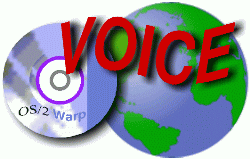

Next we interview James C. Gorman, Ph.D. Dr. Gorman does consulting in the human
services area and with Church groups. He teaches in a variety of graduate, professional
and adult education/training settings.
Dr. Gorman> I am a SOHO user of OS/2, using it primarily in my business. I
am not a technically oriented person, but am able to negotiate and deal with more
than elementary computer issues.
VOICE > What kind of business are you involved in?
Dr. Gorman> I have an independent teaching and consulting practice that services
human service and other non-profit agencies, such as churches and voluntary associations.
I use the computer in preparing teaching presentations and illustrations; proposals,
analyses and reports for clients.
VOICE > Can you please describe your current use of OS/2 in your workplace?
What kind of hardware and software are you using for OS/2?
Dr. Gorman> I have an IBM clone (486, 50mhz) with two hard drives (334Meg
and 4.3G), SCSI controller, and 16 MEG of RAM. I use Microsoft Office 4.3 under
WIN-OS2 (especially Word, Excel and Access) for the products in my business consulting,
Quicken (DOS version) for my bookkeeping, Netscape for WEB search and e-mail communications,
Disk Jockey for file management, Performance Plus for benchmarking my system, WARP
Calc for on-screen calculating, Time Tracker for recording my billable time, FAX
Works for OS/2 for sending and receiving FAXES, and IBM Anti-Virus for keeping my
system clean.
VOICE > How did you decide to use OS/2? What features were considered important
for this project(s)? What previous experience was there with OS/2 and other operating
systems?
Dr. Gorman> I made the decision to use OS/2 (at the 2.21 level) because OS/2
was then the only system that was truly multi-tasking, because of its stability
(crash-proof), and its ability to run OS/2, DOS and Windows applications. All of
these reasons were important for my choice. Prior to choosing OS/2, I had only used
MS-DOS and IBM-DOS.
VOICE > What other operating systems if any were under consideration or are
used for your business? If you use OS/2 in conjunction with other OSes in any form
of a network, how well does OS/2 work with these other systems?
Dr. Gorman> I am considering for the long run Windows NT. I don't have a network.
VOICE > Do you foresee continued/increasing use of OS/2 in this fashion?
Dr. Gorman> Yes, as long as I can be compatible with Microsoft Office. Most
of my clients use this application, and I have to produce files that can be used
by them. Currently, since my chip is only 50Mhz, I can't use Smart Suite for OS/2
which can produce files in Office 97 format.
VOICE > Are there any changes that you would like to see to OS/2 that would
facilitate your continued use or expanded use of OS/2?
Dr. Gorman> Yes! Enable OS/2 to run Windows 95/97/98 applications, so that
I can produce files and products that can be used by my clients.
VOICE > How have IBM's statements that they are targeting the medium to large
business sector affected your work or your decision to continue using OS/2 for this/these
task(s)?
Dr. Gorman> They make me nervous and depressed. Nervous, because I think IBM
will not enable me to continue using OS/2. Depressed, because I see IBM's statements
leading to the death of a good product.
VOICE > If IBM licensed another company to sell the OS/2 client to home/SOHO
users, would it affect your usage of OS/2 (would you use more OS/2 clients for your
work, etc)?
Dr. Gorman> If this other company enabled OS/2 to run windows 95/97/98 applications,
I would be very happy to continue using OS/2.
VOICE > Do you know of any other sites using OS/2 in your industry?
Dr. Gorman> Unfortunately, no.